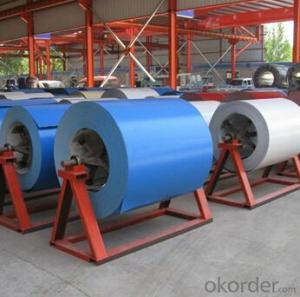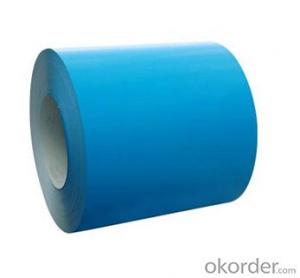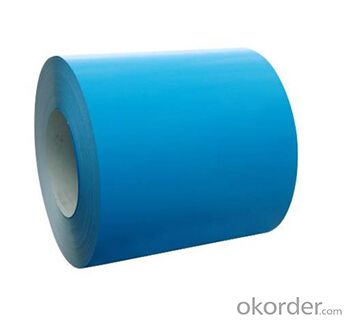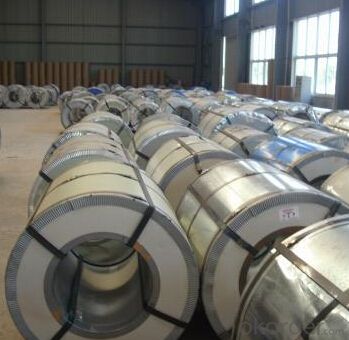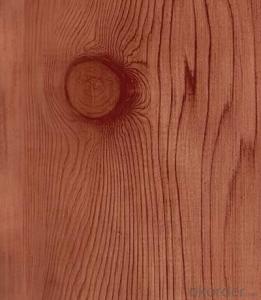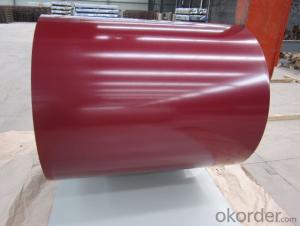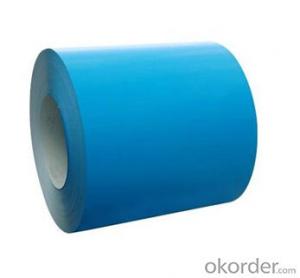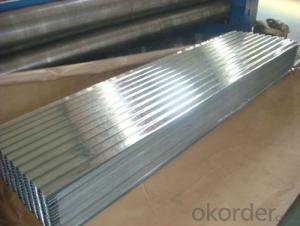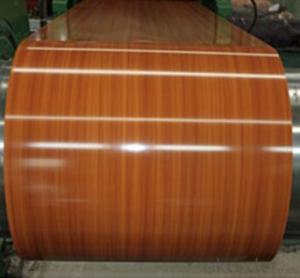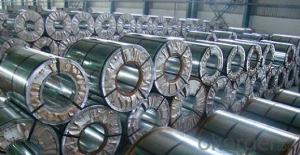Prepainted Galvanized Steel Coil- Low Price JIS
- Loading Port:
- Shanghai
- Payment Terms:
- TT OR LC
- Min Order Qty:
- 25 m.t.
- Supply Capability:
- 5000 m.t./month
OKorder Service Pledge
OKorder Financial Service
You Might Also Like
1.Structure of Prepainted Galvanized Steel Coil- Low Price JIS:
With Gi as base metal,after pretreatmet (degrease and chemical treatment) and liquid dope with several Layers of color,then after firing and cooling,finally the plate steel is called pre-painted galvanized steel ( PPGI) .Pre-painted galvanized steel is good capable of decoration ,molding,corrosion resistance
2.Main Features of Prepainted Galvanized Steel Coil- Low Price JIS:
• Excellent process capability
• Smooth and flat surface
• Workability, durability
• Excellent heat resistance performance
• High strength
• Good formability
• Good visual effect
3.Prepainted Galvanized Steel Coil- Low Price JIS Images
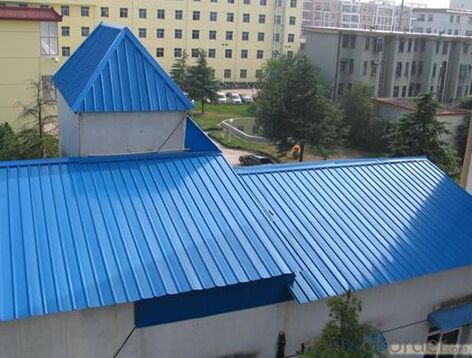
4.Prepainted Galvanized Steel Coil- Low Price JIS Specification
Standard:JIS
Grade: CGCC
Thickness: 0.15mm~3.0mm,
Width: 1250,600-1250mm
Coil weight:3-12 MT
Coil ID:508/610mm
Chemical composition:
C | Si | Mn | Cr | Ni | P | S |
0.150 | 0.476 | 11.231 | 12.50 | 0.900 | 0.039 | 0.010
|
5.FAQ of Prepainted Galvanized Steel Coil- Low Price JIS
We have organized several common questions for our clients,may help you sincerely:
1.How do you control your quality
We have established the international advanced quality management system,every link from raw material to final product we have strict quality test;We resolutely put an end to unqualified products flowing into the market. At the same time, we will provide necessary follow-up service assurance.
2.How long we will receive the goods ?
After receiving your deposit or workable lc ,our normal shipment date is 15-20days,and it takes around 28 days to reach your port of destination. But is up to different destination
3. What is your moq
Normally our moq is 25per size ,but it is up to different size.
- Q: What are the different types of edge treatments for steel coils?
- There are several different types of edge treatments for steel coils, including slit edge, mill edge, and deburred edge. Slit edge is the standard edge treatment, where the coil is slit to the desired width and the edges are left with a rough, jagged finish. Mill edge is a smoother edge treatment that is achieved by cutting the coil using a circular saw, resulting in a cleaner edge. Deburred edge is a further refinement of the mill edge, where the sharp edges are removed through a deburring process, creating a smooth, rounded edge.
- Q: What are the safety precautions when working with steel coils?
- When working with steel coils, it is important to follow several safety precautions. Firstly, workers should wear appropriate personal protective equipment (PPE) such as gloves, safety glasses, and steel-toe boots to protect themselves from potential injuries. Additionally, they should ensure that the work area is well-lit and free from any trip hazards. Proper lifting techniques should be used to prevent strains or sprains, and workers should be trained on how to safely operate any machinery or equipment involved in handling the coils. Regular inspections of the coils, checking for any defects or damages, should also be conducted to avoid accidents. Lastly, workers should be aware of the potential hazards associated with working with steel coils, such as sharp edges, pinching points, and the risk of heavy objects falling, and take necessary precautions to minimize these risks.
- Q: What is the standard width of steel coils?
- The standard width of steel coils varies depending on the specific industry and application, but it is commonly around 36 inches to 72 inches.
- Q: I asked a question last week about stainless steel and got some great answers. I combed all over the internet to try to figure this one out but could not find anything. What resists bending better: chrome vanadium steel (i.e. a steel commonly used to make tools) or stainless steel 304. My guess would be the chrome vanadium alloy but thats just a guess. Which on resist's bending better and by how much (#'s please :-)). Also, if anyone knows if chrome vanadium steel is cheaper than stainless steel 304 that would be awesome? I can't find a price per pound on chrome vanadium steel anywhere! Please help. Thanks in advance-Josh
- Type 304 stainless steel can be tempered to give tensile strength up to about 125,000 psi. There are many chrome vanadium alloys, and tempers, but they are generally very hard steels used for machine tools which are used to cut other steels. They generally are much stronger, and can be hardened up to tensile strengths of 250,000 psi and beyond. (Bending strength is proportional to tensile strength, but Cr-V steels are not usually used for beams or other structure members.) Cr-V steels are specialty alloys and will probably be a good bit more expensive per pound than common stainless alloys. For any steel, price depends on the form you are buying, i.e. plate, bar, or other shape, as well as the alloy and temper specified, and the quantity. You need to get prices from a supplier. You can find some online catalogs, but you usually have to call the vendor for price info.
- Q: What are the different types of steel finishes available for coils?
- There are several types of steel finishes available for coils, including hot rolled, cold rolled, galvanized, and stainless steel. Hot rolled steel has a rough surface and is often used for structural applications. Cold rolled steel has a smoother surface and is commonly used in appliances and automotive parts. Galvanized steel has a protective zinc coating to prevent corrosion and is used in outdoor applications. Stainless steel is resistant to corrosion and staining, making it suitable for food processing and medical equipment.
- Q: How are steel coils used in the production of wire products?
- Steel coils are an essential component in the production of wire products. These coils are typically made from high-quality steel and are used as a raw material for wire drawing processes. Wire drawing is a manufacturing technique used to reduce the diameter of the steel coil and transform it into various wire products. To begin the process, a steel coil is placed on a wire drawing machine. The machine then pulls the coil through a series of dies, which are progressively smaller in size. As the coil passes through each die, the diameter of the wire is reduced, resulting in a thinner and longer strand of wire. This process can be repeated several times until the desired wire thickness is achieved. Once the wire is drawn, it can be further processed to create various wire products such as fencing, nails, screws, springs, and electrical wires. The wire can be cut to specific lengths, bent, or shaped according to the intended use. Additionally, it can undergo treatments such as galvanizing or coating to enhance its durability and resistance to corrosion. Steel coils provide several advantages in the production of wire products. Firstly, they offer a consistent and uniform material, ensuring that the resulting wire products have consistent quality and performance. Secondly, steel coils are easily transportable and can be stored efficiently, making them a cost-effective option for manufacturers. Lastly, the versatility of steel allows for the production of wire products with different tensile strengths and properties to meet specific industry requirements. In conclusion, steel coils play a crucial role in the production of wire products. They are the primary raw material used in wire drawing processes, where they are transformed into various wire products through a series of reduction steps. The resulting wire products find applications in a wide range of industries, making steel coils an indispensable component in the manufacturing sector.
- Q: How are steel coils used in the manufacturing of industrial pumps?
- Steel coils are used in the manufacturing of industrial pumps as a primary material for constructing the pump casing, impellers, and other critical components. The steel coils are first uncoiled and then cut into specific shapes and sizes, which are then formed, welded, and machined to create the various parts of the pump. The strength, durability, and corrosion resistance of steel make it an ideal choice for ensuring the longevity and reliability of industrial pumps in demanding applications.
- Q: How are steel coils used in the production of metal doors and windows?
- Steel coils are an essential component in the production of metal doors and windows. These coils are typically made from high-quality steel and serve as the primary raw material for manufacturing these products. The first step in utilizing steel coils is the process of uncoiling. The coils are unwound and fed into a machine known as a roll former. This machine carefully shapes the steel into the desired profile for the door or window frame. The steel is typically cut to the required length before being fed into the roll former. Once the steel has been shaped, it is then sent through a series of additional manufacturing processes. These processes may include punching holes for hardware installation, bending the steel to create specific angles or curves, and welding different sections together to form a complete frame. The steel coils provide the necessary structural integrity and durability required for these processes. Furthermore, steel coils also play a crucial role in enhancing the aesthetic appeal of metal doors and windows. They can be coated with various finishes, such as galvanized or powder-coated, to provide protection against corrosion and improve the overall appearance of the final product. These coatings not only add a layer of durability but also allow for customization to match different architectural styles and design preferences. In summary, steel coils are the foundational material used in the production of metal doors and windows. They are shaped, cut, and processed to create the necessary components for these products. Additionally, steel coils can be coated to enhance their durability and aesthetic appeal. Ultimately, these coils contribute significantly to the strength, durability, and overall quality of metal doors and windows.
- Q: I love the design! It looks great, is safe, and you can see through it just fine on camera. Do you like it?BQ: Old Blue WWF Steel Cage or the newer fence type steel cage?
- TNA steel cage is alot more better i agree with you its safe and can see through it just fine on camera.. BQ: i think newer fence type because it does slow down a match and its brutal.. Old blue cage is just a bit too wide that someone can easily jump two or three squares up and finsihed, nah its too quickly finishing a match into that cage.
- Q: I just started playing guitar last year. I never changed the chords. When my sister started taking guitar lessons her teacher said that she needed to change the chords. When i bought the guitar it came with steel strings but i bought nylon strings because they are easier on the fingers. The problem is i already tuned up the guitar but it sounds really bad like if it was not tuned. What can i do about this?
- Steel and nylon strings are not interchangeable. Guitars are designed and built for either steel or nylon. Using steel strings on a guitar made for nylon will just destroy the guitar. Nylon strings won't break a steel string guitar, but they probably won't sound that great (different woods sound better with different types of strings)
Send your message to us
Prepainted Galvanized Steel Coil- Low Price JIS
- Loading Port:
- Shanghai
- Payment Terms:
- TT OR LC
- Min Order Qty:
- 25 m.t.
- Supply Capability:
- 5000 m.t./month
OKorder Service Pledge
OKorder Financial Service
Similar products
Hot products
Hot Searches
Related keywords
